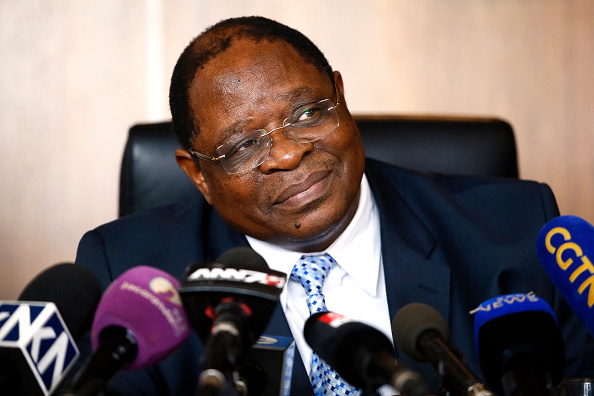You can also listen to this podcast on iono.fm here.
ADVERTISEMENT
CONTINUE READING BELOW
Download the free LiSTN audio app on Google Play, Apple or here.
JEREMY MAGGS: This leads our programme, the Council for the Advancement of the South African Constitution (Casac) has expressed its concern over the Chief Justice Raymond Zondo’s views on topics including the implementation of the recommendations of the State Capture Commission, judicial misconduct, as well as the pending prosecution of the former president, Jacob Zuma.
Dan Mafora is a senior researcher at Casac. Dan specifically, what aspects then of the chief justice’s remarks do you find concerning and why?
DAN MAFORA: Hi, Jeremy, thanks so much for having me. So the first thing is his willingness to take that question in that interview about the pending prosecution of the former president and his speculation about whether or not even if he was tried or convicted he would be the beneficiary of a remissions process similar to what happened earlier this year.
He was also speculating about the reasons why government has taken a long time or does not seem interested in implementing the State Capture Commission recommendations. That for us is the kind of speech that judges should not engage in publicly, especially in an interview, because we know that interviews tend to take a life of their own and it’s not the kind of controlled environment that judges are used to.
JEREMY MAGGS: Hence, the reason why we are having this conversation. So you’re suggesting then that the remarks potentially impact the perceived impartiality and independence of the judiciary, or is that taking it too far?
DAN MAFORA: We know that perceptions matter, and we know that Chief Justice Zondo has come under fire from the self-interested sectors of society for his role in the commission.
But we think that these remarks do have the potential to give credence to the perception of him being politically partisan, and that should be avoided at all costs.
Judges should not only be impartial, but should be seen to be impartial because they rely so much on public confidence.
JEREMY MAGGS: You’ll concede that it’s difficult to walk something like this back. Should he leave it alone or do you expect a clarification?
DAN MAFORA: So I think that the only thing that he can do now is to exercise restraint in future because there’s no point trying to walk it back because that is only going to prolong the scandal and potentially make it even more difficult.
So the best show of his acceptance that there is a line, would be change, changed behaviour going forward.
JEREMY MAGGS: We do know that there is animosity between the chief justice and the former president. Do you think that the comments could realistically impact the outcome or the proceedings of the pending corruption trial against Jacob Zuma?
DAN MAFORA: I don’t think so. I think obviously that the judges sitting in that case are independent of the chief justice and of any other influence out there, but I do think that these comments give credence or lend ammunition to what has been a persistent claim by President Jacob Zuma, that the entire judicial system is biased against him and he’s likely to point to this as evidence.
JEREMY MAGGS: But highly unlikely to affect an outcome, though.
ADVERTISEMENT
CONTINUE READING BELOW
DAN MAFORA: Highly unlikely. But again, it’s not about actualities. That’s the difficulty is all we can do is shape perceptions. Of course, we can’t control outcomes, but perceptions ultimately matter.
JEREMY MAGGS: It’s a difficult one. But how, if at all possible, should the judiciary and judicial officers then balance a right to free speech, which we all enjoy in this country, with the duty as you’ve outlined to me, to maintain judicial impartiality and even decorum?
DAN MAFORA: There’s a code of judicial conduct that sets out what are acceptable public engagements for judges to partake in.
We think that judges confine themselves to that because the line isn’t clear and it’s fuzzy, you take the risk when you venture out of those prescribed or those permissible avenues for public engagement.
So media interviews are a really difficult one because you do want to be open with the public about the role of the judiciary and their work, but you also do not want to find yourself in a situation that the chief justice finds himself now, having to respond to questions on contentious issues on the spot.
JEREMY MAGGS: But that’s the entire purpose of having the interview is to look at contentious issues. So are you suggesting that people in the judiciary shouldn’t do interviews at all?
DAN MAFORA: Well, generally, judges should not, and that has been the practice for a very long time.
We think that it’s there for a reason, we’re not muzzling judges for the sake of muzzling judges, but it serves a particular function, given the nature of their work that relies so much on the public’s buy-in, on the public’s belief, confidence in the impartiality.
JEREMY MAGGS: So you’ve waded into this debate, is Casac then going to propose or is it thinking of proposing any reforms or guidelines for judicial conduct, particularly regarding public statements or sensitive legal matters?
DAN MAFORA: Not at all. We think that the current code of conduct is sufficient. That is why we’ve come out to say it’s so clear that a line has been crossed in terms of what is currently in the code and all we’re asking is that the chief justice adhere to the code strictly.
JEREMY MAGGS: Dan Mafora, thank you very much indeed, senior researcher at the Council for the Advancement of the South African Constitution.

